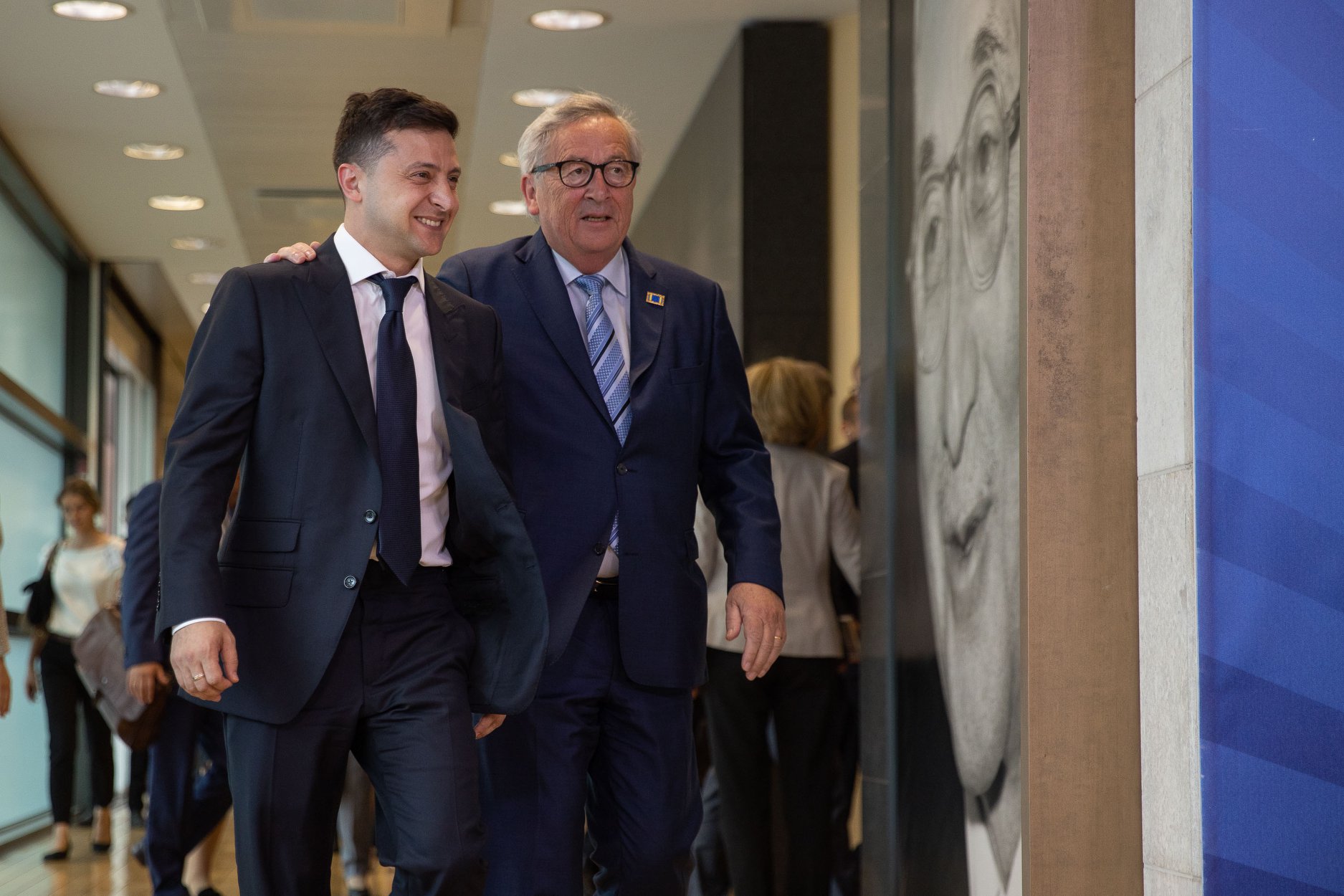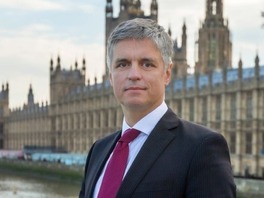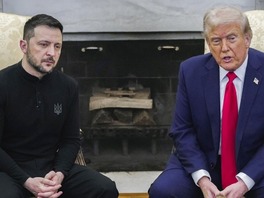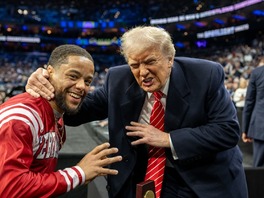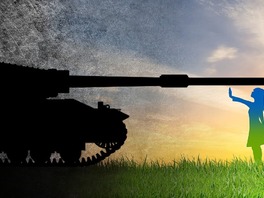President Volodymyr Zelensky left for his first foreign visit to Brussels, where he met European top officials - and many people see a certain symbolism in it. However, let us not overestimate the importance of the first visits. The Ukrainian diplomat Vasyl Filipchuk told" Apostrophe", why and with what news the newly elected President can return.
President Yushchenko made his first visit to Moscow and Yanukovych - to Brussels, but it did not help Yushchenko in relations with Russia and Yanukovych - with the EU. It is not so important where the head of state is flying, but rather what he will say there. And more importantly, what he will do at home after returning after foreign visits. Ukraine has a bad reputation of the country where politicians often say one thing, think something different, and do something which differs from the first ones. I hope the newly elected President will be able to convince the partners that bad traditions are in the past. But this will not be easy, especially in Brussels.
It should be borne in mind that the EU itself is now in a very difficult situation. In 2019, the EU is undergoing a major transformation. This concerns both the member states (Germany, France, Italy), and the whole structure of the European Union - the elections to the European Parliament, the reset of the leadership of the European Council and the European Commission, the withdrawal of the UK from the EU or staying there - only these issues are enough to understand what the thoughts of European politicians are about.
Positions of eurosceptics are strengthening, although not as it was feared at the beginning of the year, but enough to affect the modification of domestic and foreign policy in the EU. How exactly it will happen we will see closer to the end of 2019. Rapid changes in policy towards third countries are not in the traditions of the EU, so under all the options for the development of the situation in the European Union, Ukraine will remain among the priorities of EU foreign policy, but the emphasis will shift. And the visit of the new Ukrainian President will largely determine where exactly it will shift. Will we get a new credit of trust, blankcheck, as European bureaucrats say, or in a few months we will be persistently asked about the results of the fight against corruption, the intensification of internal reforms, steps to resolve the conflict in the East - that is, "Ukraine's transformation from a problem to a solution," as it is often said in Brussels.
Will Zelensky convince his interlocutors of the readiness to carry out such a transformation? Will he present to the leaders of euroinstitutions a vision of the map of modernization of the country and the rapid implementation of systemic internal reforms? We will see the answers to these and other questions soon.
As to the settlement of the conflict in the Donbas and the restoration of sovereignty over the Crimea s there is no special novelty on the part of the newly elected President, except for the impromptu of a "consultation referendum". The head of state has not yet demonstrated a new vision, new approaches or a new team in this regard.
Will it result in a repetition of what his predecessor did and went through – it is a rhetorical question. But unlike his predecessor, Zelensky does not have five years to repeat the same experiment: to talk about war, but to conduct peace talks, to declare concern for Ukrainians in uncontrolled territory and to prohibit them from carrying more than a few kilograms of food, but worst of all - to continue living a normal life, which is interrupted daily by reports of dead and wounded in Donbas.
These presidential elections confirmed what has changed in recent years and - this is the unwillingness to continue living in the paradigm of endless conflict, daily tragedies on the conflict line and empty rhetoric on TV. Therefore, sooner or later, but it is necessary to answer the main questions: how to stop the bloodshed, what to do with the Minsk agreements, if we decide to obey to them – how it should be done, if we discard - what is the alternative. It is necessary to give an answer to Ukrainian citizens and partners in Brussels.
Repeating the rhetoric of the previous President in a more or less convincing version is unlikely to be effective. Zelensky has several alternatives, not necessarily mutually exclusive. Effective diplomacy does not exclude a strong army, on the contrary - it is possible only because of it. The strengthening of sanctions does not contradict, but reinforces the proposal to return the occupied territories and return to the rule of international law in bilateral relations. Direct dialogue does not necessarily mean surrender of interests, and fear of it is a manifestation of weakness or inferiority complex. On the contrary, a strong leader and a strong country are still able to defend their position in the format of direct dialogue and during multilateral negotiations. One does not exclude the other, but rather gives a tactical advantage to the leader and the country, which is not waiting for alms, and is capable of new initiatives and innovative solutions.
In the case of negotiations with a strong opponent, it is always better to have strong allies - but one should not deceive oneself with illusions about who is our real ally today and what these allies are capable of and ready to go for.
What our partners from the EU are definitely ready to do is, at least, to maintain sanctions, if they see a clear logic of actions and a strategic plan of the Ukrainian part to resolve the conflict. Also they are ready to pay a part of the check for reforms and restoration of Donbas - if they are sure that these funds will not be stolen or wasted.
Therefore, the President in Brussels can be advised to use less empty rhetoric and more specifics. European integration will remain a formal official priority of Ukraine's foreign policy, but for at least a few decades the relations between Ukraine and the EU will be based on the Association Agreement, which for the next 20-30 years does not provide for granting Ukraine the status of a candidate country or even a potential candidate. Therefore, Ukraine has no choice but to use pragmatically the opportunities and support from the EU that exist now to solve the current problems.
The task of Ukrainian diplomacy in relations with the EU is to achieve the greatest possible amount of funds, access to funds, programs and projects. This is what the EU was created for. In the short and medium term, it is advisable to push the concept of the CES - the spread to Ukraine and its neighbors, at least those who want it, the full potential of freedom of movement of goods, services, capital and labor. And this should be done in the same way as our Western neighbors did - along with a tough defense of national economic interests, if necessary - with the use of protectionism and support for any projects that will create jobs in Ukraine.
Separately, it will be necessary to determine the place of the EU in the peace process in the Donbas and the restoration of the region. Here, the EU can do what it has done many times in such cases - organize a donor conference for the reconstruction and rehabilitation of Donbas, raise the necessary funds - at least 10-15 billion of dollars for 3-5 years - to restore infrastructure and economic growth in the East of the country.
Volodymyr Zelensky should be persistent and consistent in imposing his agenda. It's like football - if you don't score, someone will score you. If you are not able to form and offer discussion and work on those issues that consider the interests of your country - you will have to work on issues that will be formulated by others. Ukraine has a moral and political right to demand assistance and support, and the new President has a chance to get such assistance and support. Let's hope he doesn't miss it.

